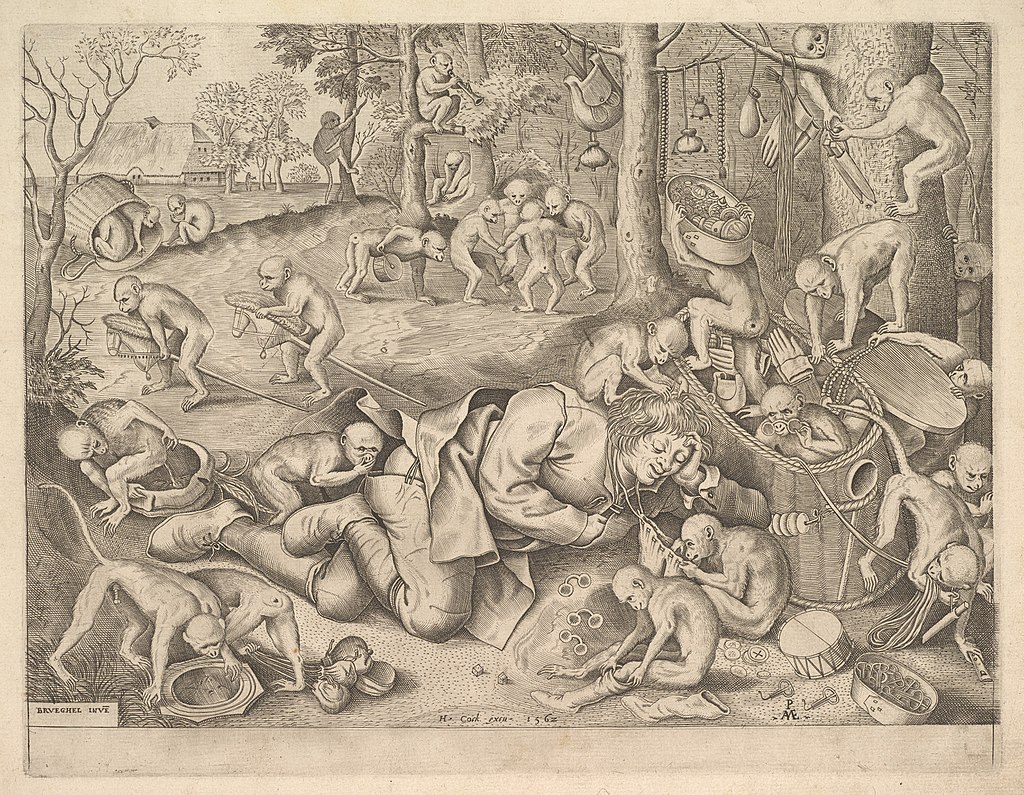
Pieter Bruegel the Elder and Pieter van der Heyden, The Merchant Robbed by Monkeys, 1562, via Wikimedia Commons. Licensed under CC0 1.0 Deed.
I’ve noticed that a striking number of the best children’s books have been written by people who had no children: Margaret Wise Brown (Goodnight Moon). H. A. and Margret Rey (Curious George). Maurice Sendak. Dr. Seuss.
I have a theory as to why. If you don’t have kids, you can only really experience the book from the child’s point of view. Parents can’t help but have all kinds of agendas when they read a book to their child. And who can blame them? As long as the child is a captive audience, why not teach them about something? Like patience, or the alphabet, or Who Simone Biles Is?
The best children’s books teach none of that. They aren’t advertisements for anything—not even the important things. They’re an advertisement for reading itself; for the entertainment value of the world itself.
Consider Curious George. The first book in the series is a full-scale assault on the senses of young children with a relentless barrage of every thrilling and dangerous thing that primally fascinates them. On successive pages in a single book, George is kidnapped (from a jungle); goes on a boat; calls 911; gets a visit from the entire fire department; then is arrested by the police for placing the call; goes to jail; then escapes jail—by flying high above the city, carried by a bunch of balloons. These things happen in the same book, in a row. It is hard to imagine a responsible parent dreaming up such a sequence at bedtime, let alone a sequel (Curious George Takes a Job) in which George explores a hospital unsupervised and passes out in bliss from inhaling ether.
Children’s books are not for teaching or moralizing or philosophizing. (That’s what articles about children’s books are for!)
At the top of this particular list of children’s authors is Esphyr Slobodkina (1908–2002). Slobodkina was an acclaimed modern artist in the early twentieth century turned illustrator of multiple children’s books, including several books by Margaret Wise Brown. Caps for Sale (1940) is her masterpiece.
In Caps for Sale, a peddler walks through his village with seventeen caps atop his head, sixteen of them for sale. “Caps for sale, caps for sale, fifty cents a cap!” calls the peddler, all day, every day, as he walks through the village. On one slow sales day, the peddler takes a nap under the tree, and while he sleeps, a pack of sixteen mischievous monkeys descend to take all his caps and then return to the tree, wearing them. This inspires the start of a second musical refrain to kick in: “You monkeys, you! Give me back my caps!” And the monkeys’ response: “Tsk, Tsk, Tsk!”
A good children’s book has a lot in common with a song. In Caps for Sale, the setup and journey of the story are really the verses that support these choruses. I loved the music of Caps for Sale, as sung by my mother when I was a kid, and as most of us do with most of our favorite songs, I memorized the lyrics without thinking too much about them.
I reconsidered the book when two pretty good posthumous sequels were published a few years ago.
In More Caps for Sale (2018), we learn more about the peddler: we follow him back through the village to his home, where, in the most beautifully drawn frame of the series, we see the mustachioed bachelor sleeping snugly all alone in the center of a small bed, in the center of a simply decorated room, under a window facing a tree that we can only hope will soon fill up with monkeys. It wasn’t until I saw that image that I realized what a lonely figure the peddler had been all along. His only interactions are with hat customers and, when even that fails, monkeys. And yet in the book he feels soulful, complete. He’s always yelling at the monkeys, for the very understandable reason that they threaten his already threadbare livelihood. But he also needs the monkeys. In all of the books, the monkeys help out the peddler once they realize the gravity of the situation. The peddler never knows this or thanks them, but it’s felt.
After reading More Caps for Sale, I bought an extra copy of the book so I could carefully tear out that beautiful image of the peddler and hang it in my own bedroom. “That is … so sad,” remarked the first person to see it.
Were these the lyrics to this song I loved? Is Caps for Sale a sad story deep down—a peddler living all alone, no friends, no family, whose only social interactions are with hat customers and monkeys?
Maybe. Maybe not. Maybe he’ll write a children’s book.
B. J. Novak is a writer and actor. He is the author of The Book With No Pictures and One More Thing: Stories and Other Stories.
from The Paris Review https://ift.tt/UakLfS1
Comments
Post a Comment